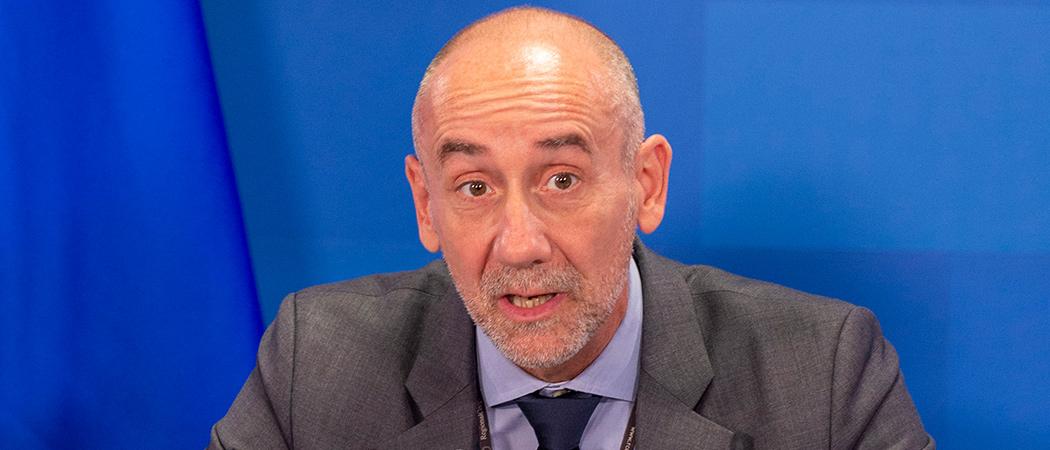Reacting to the Science|Business white paper assessing the first year of Horizon Europe, Jean-Eric Paquet confirmed the Commission is working on finetuning the next set of calls for 2023 and 2024

Jean-Eric PAQUET, EC Director-General for Research and Innovation. Photo: European Union
EU research chief Jean-Eric Paquet confirmed the European Commission is preparing to tweak the next set of Horizon Europe work programmes which will outline the calls for 2023 and 2024, as he reacted to criticism from researchers on the first year of the programme.
Responding to the complaints about lack of clarity on how to fill out Horizon’s exhaustive application forms, Paquet said the Commission is working to revamp the electronic platform but noted it won’t happen overnight. “We are busy in working on the electronic application forms to be able within that to provide guidance on every single step,” said Paquet.
A Science|Business white paper, presented to Paquet during a conference, gathered feedback on the first year of Horizon Europe from around the research community. It said that while researchers generally support the programme’s objectives, many point to a lack of guidance on how to fill out application forms, the need for more transparency in how the Commission distributes work programmes, and frustration among researchers that many calls are too broad and demanding.
Drawing on the lessons from the first year, Paquet promised the Commission will rehash the focus on research policy in calls and increase links between the different parts of the programme, including connecting big collaborative research projects with the work of the industrial partnerships.
At a different session of the Science|Business conference, EU research commissioner Mariya Gabriel said the Commission is also preparing guidance on lump sum funding for applicants ahead of 2022 calls.
“The transition to lump sum requires clear guidance, good communication to remove any uncertainties among applicants, and that’s why the necessary guidance to this end is in the pipeline and will be released in time before the first lump sum calls open in 2022,” Gabriel said.
The Commission announced plans to extend the lump sum pilot in the Horizon Europe research programme last year, but the announcement was met with scepticism by the research community which called the move ‘premature’.
Gabriel assured listeners that lump sum funding would not be applied ‘overnight’ but rather progressively to reduce bureaucracy and make the programme more attractive to newcomers and small companies that struggle with the current paperwork-heavy reporting requirements.
Recipes for scaling up innovation
Responding to Paquet, European research experts welcomed Horizon Europe but argued more can be done by the EU to churn out innovations faster, and compete with US and China.
Linda Doyle, provost of Trinity College Dublin, called Horizon Europe’s move away from excellent science towards more impact-driven innovation ‘risky’.
“When you try to over-orchestrate innovation, when you try to pick winners, you’re actually now taking risks. You’re driving things from the top-down, whereas when you’re actually investing in talent, you’re driving the bottom up. For me, the balance is tilted in the wrong way,” she said.
Because of the lack of focus on excellent science and fostering talent, Doyle gave the Horizon Europe a score of five out of ten.
Jacques Volckmann, vice president for R&D at Sanofi, French healthcare company, gave the programme a seven out of ten, noting that the EU should learn from the US how to scale up innovation. He said that Horizon Europe has all the rights tool but is missing the agility its competitors boast.
He looked to the European Commission’s new pandemic preparedness mechanism, the new European Health Emergency Preparedness and Response Authority (HERA), whose first €1.3 billion work plan for 2022 was revealed today, as an example of Europe moving in the right direction but noted its success will be conditional on understanding the needs in terms of technologies and targets, and funding innovation at scale, which means learning to share the risk with industry.
“We need to learn from the US to share the risk at scale,” said Volckmann. Looking to the National Institutes of Health in the US, he noted Europe’s R&I programmes must be more agile. “Clearly, the agility that they have there is missing.”
Doyle says this requires a complete change in thinking around innovation. Europeans have never been good at failing, trying again, and failing again. European funders ask researchers and innovators for certain deliverables, and even if a better solution is found in the course of research, the deliverables often stay the same instead of the project changing direction. This is thanks to a culture of accountability that is deeply entranched in European research, Doyle noted.
“That culture piece, driven by good reasons and accountability, is actually choking us a little bit,” said Doyle. “We could push way more in that risk oriented way.”
Håkon Haugli, chief executive of the agency Innovation Norway, was more positive about the Commission’s way of pushing green and digital innovation, congratulating the reinforced emphasis of scaling up. “From our side, we think the increased emphasis on impact but also commercialisation and scaling is much wanted and much needed in Europe,” said Haugli, who gave Horizon Europe the highest rating of the group, eight out of ten. He hopes to see the successes of the European response to the COVID-19 pandemic to be translated into other areas in terms of scalability.





 A unique international forum for public research organisations and companies to connect their external engagement with strategic interests around their R&D system.
A unique international forum for public research organisations and companies to connect their external engagement with strategic interests around their R&D system.